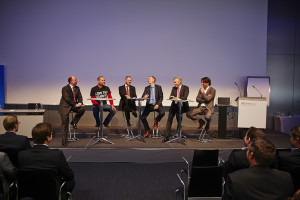Big Data & Data Science Conference
25./26. November 2013, Hotel Pullman Cologne
Open Forsight with Big Data
at Open Forsight Conference with Arbeitskreis Innovationsmanagement der Schmalenbach-Gesellschaft
15.11.2013
Parliamentary Expert Hearing Net-Neutrality
Expert hearing Net-Neutrality, Landtag Nordrhein-Westfalen, 10.10.2013
http://landtag.nrw.de
The Expertise (pdf): Netzneutralität
Medientage München
16.10.2013
“Die Verschmelzung der Medien stellt durch die Digitalisierung eine immer größere Herausforderung für deren Klassifizierung und Bewertung dar. Experten der Werbeindustrie diskutieren, wie in Zukunft alle Medienangebote mit einer einheitlichen Währung gemessen werden können, um eine Invasion von Eigen-Währungen zu vermeiden.”
Social Media Week, Berlin – “When individual choice inhibits choice: Algorithm Ethics”
Session on value judgments in algorithms and software.
In many ways, our lives are dependent on implicit value judgements: Search engine results are returned based on what they consider are individually relevant. An algorithm in the ad-network’s targeting system selects which ads we see. Image processing – instagram as well as in MRI – forms pictures of our environment on our behalf. And as drones as prepared for autonomous kill decisions, this discussion becomes existential.
These ‘decisions’ come down to algorithms, and the “Value Judgements” attached to them interfere with our daily lives. We are however usually not aware of the judgements that are buried into our many devices.
This session gives in introduction into the three different forms of value judgements in algorithms, and will go beyond the obvious “calculable” value judgements – like credit scoring – and instead address the multitude of “hidden” ethic algorithms that far more pervasive.
These value judgements include:
1) Choosing a method
2) Setting of parameters
3) How to deal with uncertainty and misclassification.
All three judgements are mostly made implicitly, so for many applications, the only way to understand these presumptions is to “open the black box” – to HACK them.
Given all that, I would like to demand three points of action:
– to the developers: you have to keep as many options open as possible and give others a chance in changing the pre-sets (and customers: you must insist of this, when you order the programming of applications);
– to the educational systems: teach people to hack, to become curious about seeing behind things.
– to our legislative bodies: make hacking things legal. Don’t let copyright, DRM and the like being used against people who re-engineer things. Only what gets hacked, gets tested. Let us have sovereignty over the things we have to deal with, let us shape our surroundings according to our ethics.
SAS Forum 2013
re:publica 2013 conference: Speech on Algorithm Ethics
re:publica 2013 conference: Speech and panel discussion on Algorithm Ethics.
Englisch sumary of my speech: Link
Video Interview: Algorithm Ethics
Video-Interview at re:publica 2013 on Algorithm Ethics.
re:publica 2013 conference: “Von Piraten und Friesennerds: Liquid Democracy in der Praxis”
re:publica 2013 conference: “Von Piraten und Friesennerds: Liquid Democracy in der Praxis”
Link
Posthuman Advertising
Datascience Day 2013, Berlin at Big Data Week 2013.
With the rise of wearable computers like Google Glass or smart agents with near human language interfaces like Siri the Internet can hardly be viewed as mere “virtual reality” anymore, it becomes more and more “augmented reality” – like an additional dimension of our body. Machine-to-machine communication is of rising influence for our lives: “the Internet of Things” of Self-driving cars, smart-metering, etc. connects our appliences with the Net’s data. Many services and devices act as gatekeepers for information: recommandation through engines or our social media connections build a filter that literarily surround us like a bubble. Advertising is of course particularily vulnerable by these filters. Thus classic media placements will less likely be able to contact us. Instead of using advertising psychology, advertising have to hack into our personal agents’ algorithms. This will be very similar to today’s search engine optimization. Promoting new goods would be trying to get into the high ranks of as many avatars’ preferences as possible. Of course, continuous business would only be sustained, if the product would be judged satisfying by our avatar when taken into consideration.
